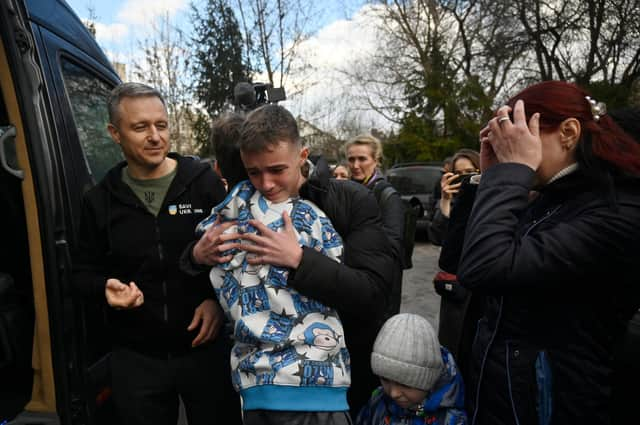Ukraine conflict: Why is Russia happy to allow ‘kidnapped children’ to return to Ukraine?
This article contains affiliate links. We may earn a small commission on items purchased through this article, but that does not affect our editorial judgement.


Fighting shows no sign of abating in the country, where air defences are in desperate need of reinforcement - according to leaked Pentagon documents. But more on that later.
First, I want to focus on the plight of tens of thousands of “kidnapped” Ukrainian children – official estimates say 19,000 but the number has been put at 150,000 by some counts – who have been forcibly removed from their parents since the war began and taken to Russia.
Advertisement
Hide AdAdvertisement
Hide AdNow, over the past month, some, albeit a small number, have begun to return.
The New York Times has spoken to mothers of some of these children, who have travelled to Russia with the help of charity Save Ukraine, in a bid to retrieve their offspring.
Ukraine’s deputy prime minister, Iryna Vereshchuk, said the Ukrainian government will form an international coalition for the return of children who were forcibly moved to Russia.
The details of their ordeal are incredible. Some children living in occupied areas were sent willingly – and innocently - by their parents to “summer camps” in Crimea earlier this year – never to return. Others were forced onto buses by teachers at their schools and sent away. Others, many of them with living family members, were taken from residential institutions and shipped across the border. The interviews with the mothers reveals that while some have had little or no contact with their children during their time away, others have been able to call home every day.
It appears that Russia is keen to now get rid of some of the children it originally took. A number of the youngsters have told their parents they need to collect them within six months of their arrival – or they will be put up for adoption to Russian families. Yet, if their parents physically come to Russia to get them – easier said than done for many people who are crippled by poverty, while men of eligible military age are not allowed to cross the Ukrainian border - they are happy to let them go free.
With the help of Save Ukraine, some families have managed to do so – and have successfully brought their children home.
Children have reported being punished physically for refusing to sing the Russian national anthem, banned from outdoor walks for being Ukrainian and being forced to rewrite Russian texts. Others have been told their parents had "abandoned" them, and that "no one is waiting for them" in Ukraine.
The psychological cost will be huge.
Meanwhile, while families reunite with their children, politicians debate the authenticity of a series of leaked documents detailing the military impact of the war on both sides.
Advertisement
Hide AdAdvertisement
Hide AdIt is unclear whether the documents, which some say have been heavily doctored, could have been leaked within America – or by Moscow. The Kremlin has not denied doing so, but also complained, rather petulantly, that Russia “is blamed for everything”.
They make worrying reading for intelligence officials, amid fears that Russia could use them – and the information they reveal about US involvement in the defence of Ukraine – to Kyiv’s detriment.
Comments
Want to join the conversation? Please or to comment on this article.
